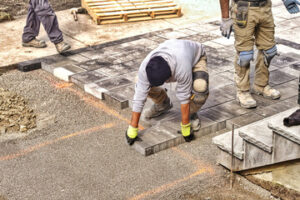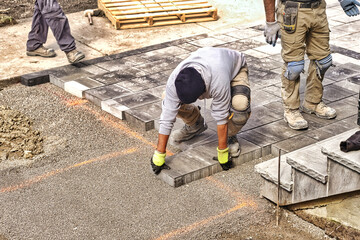A great driveway adds to the overall look of your home. It is also essential to your vehicle’s performance and safety. Many different types of materials can be used for driveway paving. Some of the most popular are concrete, asphalt and gravel. Some of these are more durable than others.
 Driveway Paving Charleston SC offers many benefits, including durability. It’s a great choice for traffic and weather conditions, requires minimal maintenance, and gives your property a great first impression. It is also an eco-friendly option that helps reduce runoff water pollution. Whether you’re looking for a simple or complex design, pavers are available in various colors, shapes, and sizes to suit any style.
Driveway Paving Charleston SC offers many benefits, including durability. It’s a great choice for traffic and weather conditions, requires minimal maintenance, and gives your property a great first impression. It is also an eco-friendly option that helps reduce runoff water pollution. Whether you’re looking for a simple or complex design, pavers are available in various colors, shapes, and sizes to suit any style.
Concrete is a popular choice for driveways, but it can crack over time due to the freeze-thaw cycle and the weight of vehicles. On the other hand, Pavers are much more resistant to cracking and can withstand the same amount of traffic as a poured concrete driveway. In addition, they’re easier to repair than a concrete driveway when damaged.
Asphalt is another economical and durable option for your driveway. It is a mix of sand, rock, and asphalt cement, and it can last 12 to 20 years. It is easy to plow snow, handles freeze-thaw cycles well, and offers excellent traction.
Brick is another popular option for a driveway, and it is often used for patios and walkways as well. It can withstand the same traffic and weather as concrete, but it can crack over time. It is best suited for climates that are not too hot or too cold.
Interlocking pavers are a more environmentally friendly option than standard concrete. They allow rainwater to soak into the ground rather than running off into drains with car oils and other pollutants. They can also be laid in a permeable pattern to make your driveway greener and more beautiful.
When choosing a driveway material, it’s important to consider both the initial costs and long-term value. The type of vehicle traffic and the climate you live in will influence which material is best suited to your needs. It’s also a good idea to consider the maintenance and upkeep costs of each material. For example, brick is expensive upfront but may not need to be resealed every two years like a poured concrete driveway. On the other hand, asphalt is affordable and durable, but it may need to be resealed annually.
Maintenance
Regardless of the type of driveway paving you choose, you’ll need to perform routine maintenance. Different types of paving materials have different needs. Some are more susceptible to general wear and tear than others. Some may require specific preventive maintenance solutions to help them last longer and look great.
Asphalt is generally the cheapest option when it comes to paving your driveway. It costs on average between $3 and $15 per square foot, compared to concrete that can cost up to $30 per square foot. The price difference largely depends on the material and installation requirements. Add-ons, such as unique designs or excavation, will also increase the total cost of your project.
An asphalt driveway should be regularly cleaned with a stiff broom and a strong hose spray. Weeds should be pulled and removed as soon as they appear, and any cracks or fissures should be filled as they appear. You should plow or shovel your driveway carefully to avoid scraping the surface. It is best to use a plastic shovel instead of steel to prevent damaging the paving.
If your asphalt driveway is showing signs of age, such as cracks or holes, you can fill them with silica sand or polymer sealer. These products will not only repair the damage but also protect it from further deterioration.
During your visual inspection, make sure you note where each hairline fracture is occurring and fill them to prevent them from expanding. If the damage is beyond your repairs abilities, you can hire a professional to resurface or patch your driveway.
Other common problems include rust stains and lichens. These can be treated with proprietary products available at most hardware stores. Lichens, in particular, can be difficult to remove as they are embedded deep within the paving blocks. Vigorous scrubbing can scratch the block surface and leave permanent marks that cannot be shifted. Lichens can be killed with a dilute solution of hydrochloric acid, although this is dangerous for personal use and should only be used by professionals. You can also use a commercial weed killer.
Design
When designing your new driveway, consider incorporating a herringbone or ashlar pattern. These patterns offer the best interlock and will help to prevent pavers from shifting, especially in high traffic areas. They also look more elegant than a standard running bond or basketweave layout. If you live in a rainier area, you may need to install drains at strategic locations to prevent water pooling.
Another important aspect to consider is the color of your pavers. Choosing a color that matches your home and complements the colors of other hardscapes in your yard will create a cohesive look. You can also choose to use contrasting colors or even multiple colors to add visual interest to your driveway.
Paver driveways allow you to create a focal point in your driveway. This can be a great way to make your driveway stand out from the rest of the neighborhood. Focal points can be created using different pattern embellishments, such as circle kits that create a classic round design or Romanesque fan shape for a more contemporary look.
Borders and bands are also popular design ideas for paver driveways. These can be created with a variety of materials, including differently textured pavers and pavers that are arranged at varying angles. Another option is to create a border or band with pavers that are a different size from the rest of the driveway. This will draw attention to specific elements of the driveway, such as a unique design element or a feature tree.
You can also create a unique texture and color combination for your borders or bands by using a paver that is a different material than the rest of the driveway. For example, you could use a cobblestone-style paver for a border to contrast with the smooth concrete of your driveway. This can create a more natural and organic look for your driveway, which will enhance the overall aesthetic of your yard.
A paver driveway is a great alternative to a poured asphalt driveway because it offers more design flexibility and durability. It can also be repaired more easily and will last longer than an asphalt driveway. If you are interested in installing a paver driveway, it is important to consult with a professional to ensure that the design will meet your needs.
Installation
Paver driveways are a great way to add curb appeal to your home and increase its value. They’re also a more environmentally friendly option than concrete, because they use less oil and gas to produce. Additionally, they’re easier to repair and maintain than traditional asphalt driveways. When installing a paver driveway, a paving contractor will first prepare the site by removing any existing surface materials. They will then level and grade the site, and lay down a base layer made of crushed rock or gravel. After the base is installed, a layer of asphalt is applied and rolled into place. Finally, the edges of the driveway are sealed and trimmed to create a smooth finish.
Pavers can be made of different materials, including concrete, clay, and natural stone. They all have their own benefits and come in a range of prices. Choosing the right material for your driveway will depend on how often it will be used and what type of weather is typical in your area. The best choice is a high quality, durable paved surface that will stand up to the elements and traffic for many years to come.
If you want to install a paver driveway yourself, it is important to lay down a foundation or sub-base before you start laying the stones. This will help keep the pavers in place and prevent them from shifting or cracking over time. Ideally, the base should be approximately 11 inches thick and should be compacted. It’s also important to use a joint sand to fill the joints between each paver, which will enhance stability and provide a beautiful, finished look.
Using pavers to make your driveway is an environmentally friendly choice, because it uses less oil and gas than concrete and lasts for longer than asphalt. They are also more flexible than concrete, which helps them resist cracking. In addition, pavers are easy to repair and replace. If one paver becomes damaged, you can simply pull it up and lay down a new one. This is much quicker and cheaper than repairing or replacing an entire driveway.
